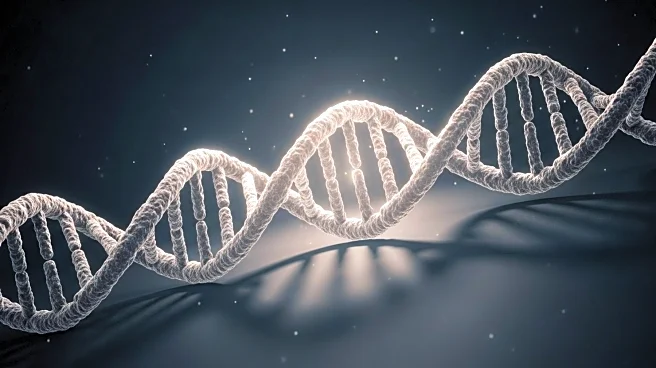What is the story about?
What's Happening?
Researchers at the Stowers Institute for Medical Research have made significant progress in understanding Robertsonian translocation, a common chromosomal abnormality affecting approximately 1 in 800 people. This condition involves the fusion of two chromosomes, resulting in individuals having one less than the typical 46 chromosomes. While often asymptomatic, it can lead to reproductive issues, prompting affected individuals to seek testing. The study, published in Nature, utilized advanced genome sequencing technologies to examine the fused chromosomes of three individuals, revealing that previously overlooked 'junk DNA' plays a crucial role in these genetic rearrangements. This discovery marks a breakthrough in basic science, providing a clearer picture of how these translocations occur and evolve.
Why It's Important?
The findings from this research have the potential to impact the understanding of genetic diseases and reproductive health. By identifying the mechanisms behind Robertsonian translocation, scientists can better assess the risks associated with infertility and certain genetic disorders. This knowledge could lead to improved diagnostic tools and preventive measures for individuals carrying these chromosomal abnormalities. Furthermore, the study highlights the importance of 'junk DNA' in genetic research, challenging previous assumptions and opening new avenues for exploration. As researchers continue to mine genetic databases, they may uncover links between Robertsonian translocation and other health risks, such as cancer, providing valuable insights for medical science.
What's Next?
Following this discovery, researchers are expected to delve deeper into genetic databases to identify individuals carrying Robertsonian chromosomes. This could help determine if these individuals are at increased risk for specific diseases or health conditions. The study's findings may also prompt further research into the role of repetitive DNA sequences in other genetic anomalies. As genome sequencing technologies advance, scientists will likely continue to uncover new genetic insights, potentially leading to novel therapeutic approaches and enhanced understanding of human biology.
Beyond the Headlines
The study's implications extend beyond immediate scientific findings, touching on ethical and societal dimensions. As genetic research progresses, questions about privacy, consent, and the use of genetic information in healthcare and insurance may arise. Additionally, the study underscores the importance of funding and support for basic scientific research, which can yield unexpected and transformative discoveries. The role of 'junk DNA' in genetic processes may also shift scientific paradigms, influencing future research directions and educational curricula in genetics.
















